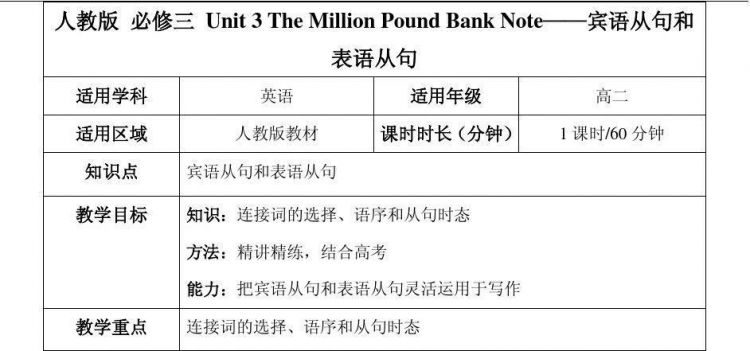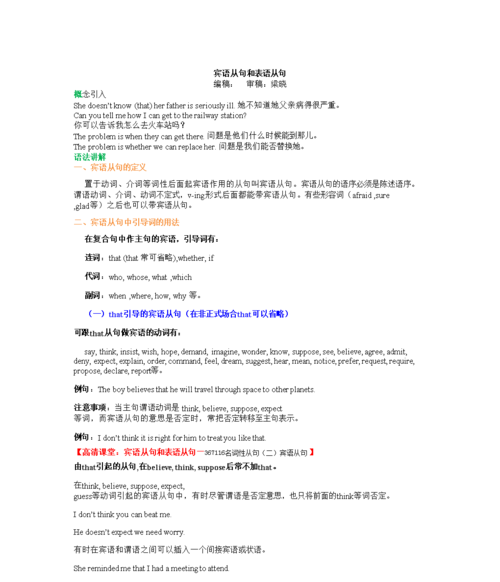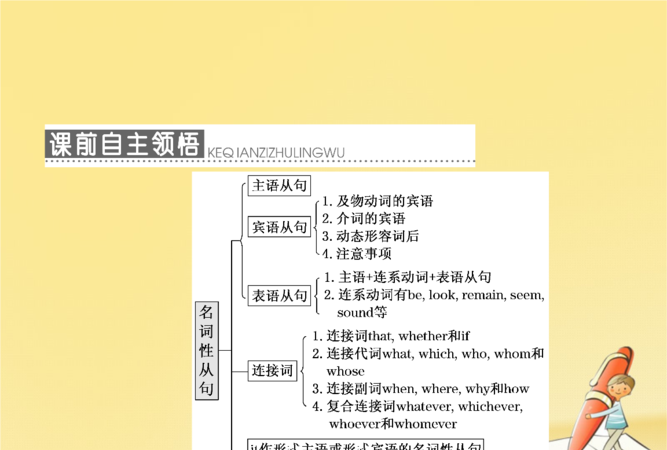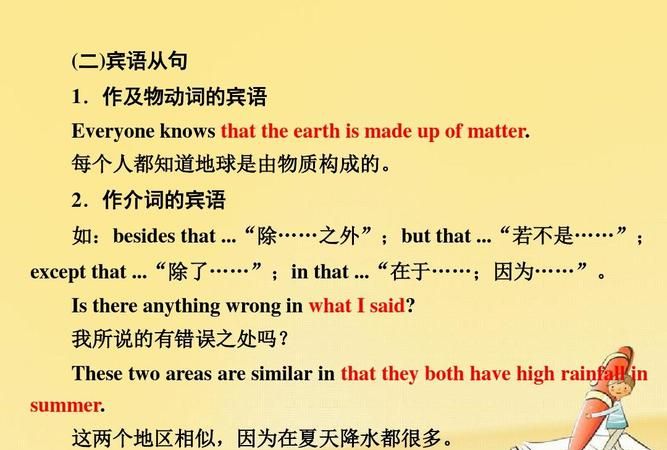本文目录
高二英语必修五教案
一、教法建议
【抛砖引玉】
单元双基学习目标
Ⅰ. 词汇学习
familiar ,be familiar with ,cap, note, can ( n . ) , hammer ,memory, tin ,marry ,get married ,single ,square, otherwise, perform, wedding, musical ,generation ,learn, by heart ,in praise of, hero ,nowadays, passerby ( 复数形式是: passers - by ),pattern, root ,thought ,gay ,ray ,part ( vt . ) ,soul ,iron,ironing ,board, whisper,jazz, folk, instrument, violin ,earn one's living ,drum ,carol ,flaming, fade
Ⅱ. 交际英语
1. I think at the beginning we'd rather have …
2. I'd prefer them not to…
3. I'd rather have … to start .
4. I'd rather not have …
5. Have you decided … ?
6. I've decided to …
Ⅲ. 语法学习
- ing 形式作表语、定语和宾语补足语的用法
1 . 动词的 ing 形式包括名词和现在分词,二者都可作表语。如:
Our job is playing all kinds of music . ( 动名词 )
The music they are playing sounds so exciting . ( 现在分词 )
注:一般来讲,动名词 ( 短语 ) 作表语,主表可互换,即:Playing all kinds of music is our job .
现在分词作表语,表明主语的性质和特征,主表不可互换。
2 . - ing 形式做定语可以表示 1 ) 所修饰名词的用途。如:
a waiting room ( = a room for waiting ) 候车室
a walking stick ( = a stick for walking ) 手杖
a sleeping car ( = a car for sleeping ) 卧车
2 ) 所修饰名词正在进行的动作,可以换成定语从句形式。 如:
a waiting man ( = a man who is waiting ) 正等待着的男人
a sleeping child ( = a child who is sleeping ) 正睡觉的孩子
a walking man ( = a man who is walking ) 正散步的男人
3 . 在 see , hear , feel , watch , notice 等感观动词后可以用 - ing 形式做宾语补足语。这时 - ing 形式和句子的宾语之间存在着逻辑上的主谓关系,并且 - ing 形式表示宾语正在进行的动作。如:
He saw a girl getting on the tractor . ( = He saw a girl and the girl was getting on the tractor . ) 他看见一个女孩在往拖拉机上爬。
Do you hear someone knocking at the door? 有人敲门你听见了吗?
【指点迷津】
Ask the students to use the information from the reading passage to describe what they have learnt about music .
Kinds of music
More details
Folk music
It has been passed down from one generation to another . At first it was never written down . People learned the songs from their families , relatives , neighbours and friends in the same village . These songs were about the country life , the seasons , animals and plants , and about love and sadness in people's lives .
African music
It plays an important part in people's lives , especially for work , and at festivals and weddings , when people dance all night long .
Indian music
It's not written down . There is a basic pattern of notes which the musician follows . But a lot of modern music is also written . India also produces films with music , and millions of records are sold every year .
Music in the Caribbean
The slaves who were brought from Africa developed their own kind of music . West Indians make musical instruments out of large oil cans . They hit different parts of the drum with hammers to produce different notes . This type of music has become very famous in Britain and is very good music to dance to .
Jazz
Jazz was born in the USA around 1890 . It came from work songs sung by black people and had its roots in Africa . Jazz started developing in the 1920s in the southern states , Soon it was played by white musicians , too , and reached other parts of the USA .
二、学海导航
【学法指要】
单元重点词汇点拨
1 . familiar 意为“世所周知,熟悉的;看惯的,听惯的,耳熟的”,其后通常跟介词 to 连用。例如:
a familiar face / voice 熟悉的脸 / 声音
His name is familiar to me , but I haven't met him .
These tales are familiar to Chinese children .
familiar 还可以表示“ ( 某人 ) 熟悉 ( 某事 ) 的,精通……的,通晓……的”,其后通常可以跟介词 with 连用。
例如:
He is more familiar with modern jazz than I .
I am not familiar with the names of plants .
通过以上例句我们可以看出:
①事物当主语时,作“为人所熟悉”解,与 to 连用;但人当主语时,作“熟悉某事物”解时,则与 with 连用。又如:
Alpine plants are familiar to him . ( = He is familiar with alpine plants . )
②人当主语而与 with 连用时,with 之后若接事物的话就是“熟悉”之意,若接人的话就变成了“亲密”之意,但这个“亲密”往往很容易变成“亲昵、放肆”。
2 . marry 用作动词,意为“结婚;嫁,娶,与……结婚”,其名词形式为 marriage , 形容词形式为 married。例如:He married a classmate from high school .
Kate married a Frenchman last year .
He married his daughter to a doctor .
Mr Smith married Miss Kate five years ago .
另外,短语 be married ( to ) 意为“与……结婚,嫁给”;get marred ( to ) 意为“与……结婚,嫁给……”;marry sb . to 意为“把……嫁给……”。例如:
The old couple have alread
y been married for fifty years .
She has got married to a man from her hometown .
They married their youngest daughter to a man with a lot of money .
3 . perform 用作动词,意为“执行,完成,做;演出,表演”。例如:
They computer performs these calculations with surprising speed .
The surgeon was performed a dangerous operation .
The singer had never performed in Beijing before .
He will be performing on the flute tonight .
4 . praise 可用作及物动词,意为“赞扬,表扬”,例如:
He was praised for his good works .
They praised him for risking his life to save his comrade .
He was praised for finishing his work ahead of time .
praise 还可以用作名词,意为“赞扬;赞扬的话 ( 用复数 ) ”。例如:
My books received high praise from general readers .
The teacher's praise had greatly encouraged us .
The praise of mine usually made the students feel very happy .
5 . nowadays 用作副词,表示与以前相比,意为“时下;现今”,常与一般现在时动词连用。例如:
Nowadays a lot of people go abroad .
Nowadays young people prefer watching TV to reading books .
They used to read novels , but nowadays they read newspapers .
单元词组思维运用
1 . in praise of 意为“称赞,赞扬 ( = to praise ) ”。例如:
He made a report in praise of country life .
We all spoke in praise of the boy's courage and bravery .
2 . learn … by heart 意为“记住;背诵”。例如:
I have learned the reading materials by heart .
Have you learned by heart the main points of the article?
It's very difficult for the children to learn the poem by heart .
3 . earn one's living 意为“谋生;挣钱”。例如:
He had to earn his living at the his early age .
The fishermen earned their living by fishing .
Some people earn their living by writing stories .
4 . play the guitar / piano / violin / flute , 英语中表示乐器的名词前通常要用定冠词。
I used to play the flute after school , but I usually operate the computer at present .
She couldn't learn to play the piano quite well without a teacher .
Which can you play better , the guitar or the flute?
The lady often enjoyed herself by playing the violin after supper
单元难点疑点思路明晰
1 . I'd prefer them not to play too loudly at the beginning . 我宁愿让他们开始时别那么大声演奏。
prefer 宁愿……,喜欢…… ( 甚于喜欢 )
prefer sb . to do sth . 宁可 ( 某人 ) 做某事 ( 不定式作宾补 )
They preferred their son to go to college .
They preferred her not to go with them .
prefer sth . / doing to sth . / doing 喜欢……而不喜欢
prefer tea to coffee .
I prefer reading novels to watching TV .
prefer to do… rather than do … 宁愿…而不愿…
I prefer to go to the movies rather than stay home .
= I prefer going to the movies to staying home .
= I would rather go to the movies than stay home .
2 . Otherwise we won't be able to hear ourselves talk . 否则我们就听不到自己讲话的声音了。
( 1 ) otherwise ( corj ) 否则,不然, = or = or else .
Hurry up , otherwise you'll be late .
Don't move , otherwise I'll shoot you .
( 2 ) hear sb . do sth . 听某人做某事
不定式作宾补省 to 的动词可按下面顺口溜记忆。
五看,三使役,二听,一感,半帮助,不定式作宾补,to 字要删去,主动变被动,宾补变主补,to 字要恢复。五看:see , watch , notice , look at , observe ; 三使役:have , let , make ; 二听:hear , listen to ; 一感觉:feel ; 半帮助:help
I saw Xiao Li enter the room just now . →Xiao Li was seen to enter the room just now .
help my mother ( to ) do some housework . →My mother is helped to do some housework .
3. Folk music has been passed down from one generation to another .
In this way stories were passed on from one person to another .
pass down / on 传下去,传授,传给
The news was passed on / down by word of mouth .
The teachers pass on their knowledge to the students .
pass by 经历 pass over 不重视 pass through 经历、穿过等
4. On festivals they used to act and sing in praise of heroes who lived long ago .
It plays an important part in people's lives , especially for work , and at festivals and weddings…它在人们的生活中起着重要的作用,特别是为了劳动,以及在节日和婚礼上…
on festivals at festivals 在节日。如果指节日当天,应用on 。 on Christmas Day 圣诞节那天 on Christmas Eve 圣诞节前夕 on New Year's Day 元旦那天 on Children's Day 在儿童节那天。但如果把节日视作一个时节,指节日的整个时期,则应用 at。 at Christmas 在圣诞节期间 at New Year 新年期间。
in praise of 意为“赞扬”
The leader s
poke in praise of the man who had given his life for the cause . 领袖称赞那位为事业而捐躯的人。
介词 in + n . + of 常见短语
in front of 在……前面 in spite of 尽管,虽然 in charge of 负责 in favour of 支持……,赞成…… in face of 面对……,在……面前 in search of 寻找
5. India produces more films than any other country in the world . 印度摄制的影片比世界上任何其它国家都多。
= India produces the most films in the world .
※用比较级表达最高级的意义。
Xiao Li is taller than any other student in our class .
= Xiao Li is the tallest student in our class . 小李比我们班其它同学都高。
( other 后的名词应用单数形式 ) 。
比较级应注意避免和包括自身的对象比。
比较级 + than + any other + 单数名词
比较级 + than + all the other + 复数名词
比较级 + than + anyone else
Mary is taller than any other student in the class .
Mary is taller than any other girl in the class .
Mary is taller than anyone else in the class .
Mary is taller than all the boys in the class .

高中英语差的很怎样才能补起来
表语从句是用一个句子作为表语,说明主语是什么,由名词、形容词或相当于名词或形容词的词或短语充当表语。结构一般为:主语+连系动词+句子作表语(表语从句)。
连接表语从句的连接词有:that, what, who, when, where, which, why, whether, how, whoever,whichever ,whatever等。还有如because, as if, as though等。
表语成分
表语是用来说明主语的身份、性质、品性、特征和状态的,表语常由名词、形容词、副词、介词短语、不定式、动词的-ing、从句来充当,它常位于系动词(be, become, appear, seem,look,sound,feel,get,smell等词)之后。如果句子的表语也是由一个句子充当的,那么这个充当表语的句子就叫做表语从句。
相关说明
1、名词作表语
Africa is a big continent.
非洲是个大洲。
That remains a puzzle to me.
这对我还是个难题。
2、代词作表语
What’s your fax number?
你的传真号是多少?
Who's your best friend?
你最好的朋友是谁?
3、形容词作表语
I feel much better today.
我今天感觉好多了。
He is old but he is healthy。
他很老,但他很健康。
4、数词作表语
She was the first to learn about it.
她是第一个知道的人。
5、不定式作表语
Her job is to sell computers.
她的工作是销售电脑。
Our next step was to get raw materials ready.
我们下一步是把原料准备好。
6、介词短语作表语
The patient is out of danger.
病人脱险了。
I don’t feel at ease.
我感到不自在。
7、副词作表语
The sun is up.
太阳升起来了。
I must be off now.
我得走了。
8、从句作表语
This is what he said.
这就是他所说的话。

高中英语写作课的教学过程设计
高中英语写作历来是学生最头疼的难点之一。造成这种现象主要有以下两方面的原因,首先,书面表达是学生英语运用能力的综合体现。换句话说,写作时,我们不仅仅是写出一连串的句子,我们需要用句子构成一篇文章。其次,从大纲要求到高考命题,从评分标准到教材的编写,这些都从某种程度上制约着学生的创造性和求知乐趣。其实在高中英语写作教学中,可以运用以下教学方法来让学生掌握相应的写作技巧,帮助学生更好地掌握英语写作。
高中英语写作教学方法之过程法
1.写前准备(pre-writing)——语言输入阶段
写前准备是写作的准备阶段,对之后要进行的成功写作至关重要。在写作前的教学设计时,原则上教师需要先一步选好话题,话题的选择成功与否在某种程度上直接影响本节课的教学效果。如果选择的话题贴近学生的生活,唤起学生的兴趣,那么,学生就会有说不完的话。相反,如果老师选择的话题让学生不感兴趣,那么,整堂课的教学效果一定会大打折扣,学生的积极性和主动性无法充分调动起来。例如外研社英语教材必修4模块2 的写作要求学生描述交通堵塞的现状、分析造成这些现象的原因以及提出相应的解决方法。考虑到学生情况,老师的话题可以布置为讨论延安交通堵塞的现状、分析延安交通堵塞原因以及为延安交通堵塞提出合理可行的解决方法。这些话题的设置,符合学生生活的实际,是学生熟悉的场景,当然可以充分调动起来学生的积极性。
此外,写前准备阶段另外一个主要的任务是为学生提供大量的语言输入,为学生的语言输出即写作做铺垫和准备。根据笔者多年的教学经验,它的实现途径可通过头脑风暴(brainstorming)等多种方式实现。但是,目前在我们高中英语写作教学中最受推崇的应该是读写(reading-writing)教学模式。该教学模式是将写作能力训练渗透到阅读之中,以“读”促“写”,以“写”带“读”。例如,外研社教材必修4 模块2 的写作部分,教材首先展示了一篇描写作者当地交通堵塞问题的问章,为学生提供可以模仿的文章,然后在文后设置了这么几个问题:
Question1: How many problems does the passage talk about?
Question2: What are the reasons for these problems?
Question3: What are the solutions to the problems?
Question4: Why does the writer divide the whole passage into two paragraphs?
这几个问题设置的非常巧妙。前三个细节问题旨在帮助学生积累与交通堵塞相关的词汇与表达方法。通过这些问题,降低了学生后面写作的难度。最后一个问题旨在引领学生对文章布局、篇章结构的把握。
作为教师水到渠成,可以进一步通过两个问题引导学生:
If we want to write a similar passage, how many paragraphs should we write?
What should we write in each paragraph?
在读写教学模式中,教师不能只是单纯的教学生写什么,而是教学生怎么写,充分利用写作课中的范文,引导学生分析范文,培养和训练学生的写作思维方式,帮助学生确定写作大纲。
2.写作中(while-writing)——草稿阶段
在确定写作目标,明确写作大纲之后,学生要进行的下一步是收集素材,选择合适合词汇与语法结构完成初稿。这一阶段所使用的技巧主要是讨论。通常学生在写作时,他们的问题不仅仅是难于找到合适的词语和正确的语法,而且难于用第二语言去发现题材和表达思想。这其实就是第二语言交际的问题。要解决这一问题,教师可以组织讨论,让学生通过与同龄人的交流时有机会说、读、写所学的语言,这样就能减少他们在写作中不知道如何去表达他们思想的焦虑。通过讨论,进一步降低写作的难度。通过讨论,使学生形成合作的学习氛围。而在讨论结束之后,学生动手进行写作。这时候,他们写作的信心增加,动手写的欲望也增强了。
3.写作后(post-writing)——修改评价阶段
写作是一个反复的过程,学生完成了初稿并不意味着写作的结束,而要进行修改。但是,受传统观念影响,高中英语课堂的写作常常是单向的学生写作,教师修改。这种教学模式在不论是第二外语习得还是写作技巧的提高方面都有缺陷,因为学生没有足够的机会与听众交流自己的思想,以更好的了解他们自身的优缺点,自己纠正错误。因此,学生完成了初稿,教师应该做的不是用红笔圈点错误,而应帮助学生去认识如何提高写作。
那么如何引导学生进行评价和修改呢?可以通过三种方式:1)自评即学生先自己检查评价和修改。2)同学互评即学生一对一交谈或是分成二至四人一组,互相批改作文,进行修改。3)教师总评即教师不仅看学生的原文,还看学生的自评和互评,然后对学生的作文进行总评。这种互动式课堂教学法能帮助学生产生容易让人理解的结果,得到来自师生中有益的反馈,帮助学生完善知识系统,同时也给每位学生输入新的知识。当然,在实施评价系统中,教师可预先给出一套“评改”的方法。第一步:看文章内容是否切题,调理是否清楚,文章结构是否严谨,语言表达是否通顺恰当。第二部:看有无明显的语法错误、拼写错误等。
总而言之,过程法符合第二语言习得规律,符合学生的认知规律,强调写作是过程而非结果,强调学生是主体,鼓励学生参与讨论了,发挥学习主体的积极性和主动性,使学生在与同伴、老师的互动中完成习作。
高中英语写作七原则
1、长短句原则
工作还得一张一弛呢,老让阅卷老师读长句,累死人!写一个短小精辟的句子,相反,却可以起到画龙点睛的作用。而且如果我们把短句放在段首或者段末,也可以揭示主题:
As a creature, I eat; as a man, I read. Although one action is to meet the primary need of my body and the other is to satisfy the intellectual need of mind, they are in a way quite similar.
如此可见,长短句结合,抑扬顿挫,岂不爽哉?牢记!
强烈建议:在文章第一段(开头)用一长一短,且先长后短;在文章主体部分,要先用一个短句解释主要意思,然后在阐述几个要点的时候采用先短后长的句群形式,定会让主体部分妙笔生辉!文章结尾一般用一长一短就可以了。
2、主题句原则
国有其君,家有其主,文章也要有其主。否则会给人造成“群龙无首”之感!相信各位读过一些破烂文学,故意把主体隐藏在文章之内,结果造成我们稀里糊涂!不知所云!所以奉劝各位一定要写一个主题句,放在文章的开头(保险型)或者结尾,让读者一目了然,必会平安无事!
特别提示:隐藏主题句可是要冒险的!
To begin with, you must work hard at your lessons and be fully prepared before the exam(主题句). Without sufficient preparation, you can hardly expect to answer all the questions correctly.
3、一二三原则
领导讲话总是第一部分、第一点、第二点、第三点、第二部分、第一点…如此罗嗦。可毕竟还是条理清楚。阅卷老师们看文章也必然要通过这些关键性的“标签”来判定你的文章是否结构清楚,条理自然。破解方法很简单,只要把下面任何一组的词汇加入到你的几个要点前就清楚了。
1)first, second, third, last(不推荐,原因:俗)2)firstly, secondly, thirdly, finally(不推荐,原因:俗)
3)the first, the second, the third, the last(不推荐,原因:俗)
4)in the first place, in the second place, in the third place, lastly(不推荐,原因:俗)
5)to begin with, then, furthermore, finally(强烈推荐)
6)to start with, next, in addition, finally(强烈推荐)
7)first and foremost, besides, last but not least(强烈推荐)
8)most important of all, moreover, finally
9)on the one hand, on the other hand(适用于两点的情况)
10)for one thing, for another thing(适用于两点的情况)
建议:不仅仅在写作中注意,平时说话的时候也应该条理清楚!
4、短语优先原则
写作时,尤其是在考试时,如果使用短语,有两个好处:其一、用短语会使文章增加亮点,如果老师们看到你的文章太简单,看不到一个自己不认识的短语,必然会看你低一等。相反,如果发现亮点—精彩的短语,那么你的文章定会得高分了。其二、关键时刻思维短路,只有凑字数,怎么办?用短语是一个办法!比如:
I cannot bear it.
可以用短语表达:I cannot put up with it.
I want it.
可以用短语表达:I am looking forward to it.
这样字数明显增加,表达也更准确。
5、多实少虚原则
原因很简单,写文章还是应该写一些实际的东西,不要空话连篇。这就要求一定要多用实词,少用虚词。我这里所说的虚词就是指那些比较大的词。比如我们说一个很好的时候,不应该之说nice这样空洞的词,应该使用一些诸如generous, humorous, interesting, smart, gentle, warm-hearted之类的形象词。再比如:
走出房间,general的词是:walk out of the room
但是小偷走出房间应该说:slip out of the room
小姐走出房间应该说:sail out of the room
小孩走出房间应该说:dance out of the room
老人走出房间应该说:stagger out of the room
所以多用实词,少用虚词,文章将会大放异彩!
6、多变句式原则
1)加法(串联)都希望写下很长的句子,像个老外似的,可就是怕写错,怎么办,最保险的写长句的方法就是可以在任何句子之间加and,但最好是前后的句子有先后关系或者并列关系。比如说:
I enjoy music and he is fond of playing guitar.
如果是二者并列的,我们可以用一个超级句式:
Not only the fur coat is soft, but it is also warm.
其它的短语可以用:
besides, furthermore, likewise, moreover
2)转折(拐弯抹角)批评某人缺点的时候,我们总习惯先拐弯抹角说说他的优点,然后转入正题,再说缺点,这种方式虽然阴险了点,可毕竟还比较容易让人接受。所以呢,我们说话的时候,只要在要点之前先来点废话就够了。
The car was quite old, yet it was in excellent condition.
The coat was thin, but it was warm.
更多的短语:
despite that, still, however, nevertheless, in spite of, despite
3)因果(so, so, so)昨天在街上我看到了一个女孩,然后我主动搭讪,然后我们去咖啡厅,然后我们认识了,然后我们成为了朋友…可见,讲故事的时候我们总要追求先后顺序,先什么,后什么,所以然后这个词就变得很常见了。其实这个词表示的是先后或因果关系!
The snow began to fall, so we went home.
更多短语:
then, therefore, consequently, accordingly, hence, as a result, for this reason, so that
4)失衡句(头重脚轻或头轻脚重)有些人脑袋大,身体小,或者有些人脑袋小,身体大,虽然我们不希望长成这个样子,可如果真的是这样了,也就必然会吸引别人的注意力。文章中如果出现这样的句子,就更会让考官看到你的句子与众不同。其实就是主语从句,表语从句,宾语从句的变形。
举例:This is what I can do.
Whether he can go with us or not is not sure.
5)附加(多此一举)如果有了老婆,总会遇到这样的情况,当你再讲某个人的时候,她会插一句说,我昨天见过他;或者说,就是某某某,如果把老婆的话插入到我们的话里面,那就是定语从句和同位语从句或者是插入语。
The man whom you met yesterday is a friend of mine.
I don’t enjoy that book you are reading.
Mr liu, our oral English teacher, is easy-going.
其实很简单,同位语—要解释的东西删除后不影响整个句子的构成;定语从句—借用之前的关键词并且用其重新组成一个句子插入其中。
6)排比(排山倒海句)文学作品中最吸引人的地方莫过于此,如果非要让你的文章更加精彩的话,那么我希望你引用一个个的排比句,一个个的对偶句,一个个的不定式,一个个地词,一个个的短语,如此表达将会使文章有排山倒海之势!
Whether your tastes are modern or traditional, sophisticated or simple, there is plenty in London for you.
Nowadays, energy can be obtained through various sources such as oil, coal, natural gas, solar heat, the wind and ocean tides.
We have got to study hard, to enlarge our scope of knowledge, to realize our potentials and to pay for our life.(气势恢宏)
要想写出如此气势恢宏的句子非用排比不可!
7、挑战极限原则
既然是挑战极限,必然是比较难的,但是并非不可攀!
原理:在学生的文章中,很少发现诸如独立主格的句子,其实也很简单,只要花上5分钟的时间看看就可以领会,它就是分词的一种特殊形式,分词要求主语一致,而独立主格则不然。比如:
The weather being fine, a large number of people went to climb the Western Hills.
Africa is the second largest continent, its size being about three times that of China.

高中英语从句语法归纳总结
高中英语主要要掌握三大从句。
分别是:
1、定语从句(形容词从句)
2、名词词从句(包括主语从句,宾语从句,表语从句,同位语从句)
3、状语从句(副词性从句,包括时间,地点,结果,目的,原因等)
一、定语从句:
定语从句(Attributive
Clauses)在句中做定语,修饰一个名词或代词,被修饰的名词,词组或代词即先行词。定语从句通常出现在先行词之后,由关系词(关系代词或关系副词)引出。
1、关系代词引导的定语从句
关系代词所代替的先行词是人或物的名词或代词,并在从句中充当主语、宾语、定语等成分。关系代词在定语从句中作主词保持一致。
(1),
who,
whom,
that
这些词代替指人,“whom”作宾语指人,“that”既可作主语又可作宾语(作宾语可以省略),可以指人也可以指物。
(2),Which
用来指人或物
(用作主语、宾语,作宾语时可以省略)
(3),whose
“whose”表示谁(可以为人也可以为物)的(东西)
2、关系代词引导的定语从句
(1),关系副词why主要用于修饰表示原因的名词(主要是the
reason),同时它在定语从句中用作原因状语。
(2),关系副词when主要用于修饰表示时间的名词,同时它在定语从句中用作时间状语。
(3),关系副词where主要用于修饰表示地点的名词,同时它在定语从句中用作地点状语。
3、非限制性定语从句
它起补充说明作用,缺少也不会影响全句的理解。在非限制性定语从句的前面往往有逗号隔开。
二、名词性从句
在句子中起名词作用的句子叫名词性从句
(Noun
Clauses)。
名词性从句的功能相当于名词词组,
它在复合句中能担任主语、宾语、表语、同位语、介词宾语等,因此根据它在句中不同的语法功能,名词性从句又可分别称为主语从句、宾语从句、表语从句和同位语从句。
引导名词性从句的连接词可分为三类:
1、连词(5个):that
(宾语从句或表语从句中that有时可以省略)
whether,if
(均表示“是否”表明从句内容的不确定性)
as
if
,as
though
(均表示“好像”,“似乎”)
以上在从句中均不充当任何成分
2、连接代词(9个):what,
whatever,
who,
whoever,
whom,
whomever,
whose,
which,
whichever
3、连接副词(7个):when,
where,
how,
why,
whenever,
wherever,
however
三、状语从句
状语从句
(Adverbial
Clause)
状语从句指句子用作状语时,起副词作用的句子。它可以修饰谓语、非谓语动词、定语、状语或整个句子。根据其作用可分为时间、地点、原因、条件、目的、结果、让步、方式和比较等从句。状语从句一般由连词(从属连词)引导,也可以由词组引起。从句位于句首或句中时通常用逗号与主句隔开,位于句尾时可以不用逗号隔开。
状语从句细分的话,共包括九种:
1.时间状语从句
2.地点状语从句
3.原因状语从句
4.条件状语从句
5.目的状语从句
6.让步状语从句
7.比较状语从句
8.方式状语从句
9.结果状语从句

以上就是关于高中英语表语从句教案设计,高二英语必修五教案的全部内容,以及高中英语表语从句教案设计 的相关内容,希望能够帮到您。
